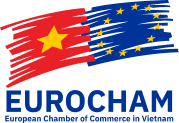Progress on Work Permits for Foreigners
On 20 April, EuroCham and its Human Resources & Training Sector Committee (HR&TSC) attended a workshop organized by the Centre for Trade Promotion and Investment (ITPC) and the Ho Chi Minh City Department of Labour Invalids and Social Affairs (HCMC DOLISA) to discuss the issue of work permits for foreigners following the introduction of Decree […]
EuroCham and ITPC Discuss Co-operation on Trade and Investment
On 16 April 2021, the European Chamber of Commerce (EuroCham) and the Investment and Trade Promotion Center of Ho Chi Minh (ITPC) had a courtesy meeting to further enhance partnership between the two organisations. The new Director of ITPC – Mr. Nguyen Huu Tin – emphasized that COVID-19 had obstructed many trade activities but […]
Meeting between EuroCham and HCMC Customs Department
On Tuesday 20 April, EuroCham met with the Ho Chi Minh City Department of Customs (HCMC DOC) and representatives from the Export-Import, Tax, Control, and Management departments at the offices of the DOC. In the meeting, EuroCham Chairman Alain Cany and Director of the HCMC DOC Dinh Ngoc Thang discussed opportunities […]
ADVOCACY UPDATE (MAR – APR 2021)
I. EVENTS On 8 April in Hanoi, EuroCham welcomed H.E. Tran Thanh Huan, congratulating him on his new position as Director-General of Local Diplomacy Facilitation Department, Ministry of Foreign Affairs. Read more here. ——————— On 6 April, EuroCham Chairman Alain Cany, made his first official visit to the Office of […]
EuroCham Office Warming
On Tuesday 20 April, EuroCham was delighted to welcome sponsors, corporate partners, and friends from our nine affiliated business associations to our official office warming in Ho Chi Minh City. Since February, EuroCham has been proud to call Deutsches Haus our home in the south, joining a range of other European companies and […]
EuroCham Participates in Vietnam National Branding Forum
On Monday 19 April, EuroCham Board Member Thue Quist Thomasen represented EuroCham at the 2021 Vietnam National Branding Forum in Ho Chi Minh City. The event, themed “Vietnam’s National Brand: New Position, New Value” was organized by Vietnam’s Trade Promotion Agency and the Ministry of Industry and Trade. The Vietnam National Branding […]
Hanoi Luncheon – Compliance and Corporate Governance Changes in Vietnam: What You Need to Know
On 7 April, EuroCham hosted an event “Compliance and Corporate Governance Changes in Vietnam: What You Need to Know” in Hanoi with special guest speakers from Acclime and Allens. EuroCham’s new Chairman, Mr Alain Cany, opened the luncheon and made his first official welcome to guests and members. He promised to continue advocating for […]
EuroCham Meeting with Director-General of Local Diplomacy Facilitation Department of the Ministry of Foreign Affairs of Vietnam
On the 8th of April 2021, in Hanoi, EuroCham welcomed H.E. Tran Thanh Huan, congratulating him on his new position as Director-General of Local Diplomacy Facilitation Department, Ministry of Foreign Affairs of Vietnam (MOFA). Mr. Le Gia Thinh, Head of Provincial Section also joined the meeting. From EuroCham, Chairman Alain Cany, Vice […]
[Webinar] EU-Vietnam Road Safety Dialogue
On 8 April 2021, EuroCham – together with Bosch Vietnam and the Safer Roads Foundation – hosted an event on road safety entitled “EU-Vietnam Dialogue on Road Safety”. The event, held in-person in Hanoi as well as online, also featured special guest speakers Mr Henrik Hololai from the European Commission’s Directorate General on Mobility and […]
EuroCham Chairman Alain Cany Met with Minister, Chairman of the Office of Government H.E. Mr. Mai Tien Dung
On 6 April 2021, the newly-elected EuroCham Chairman, Mr. Alain Cany, made his first official visit to the Office of Government of Vietnam where he was welcomed by Minister, Chairman H.E Mr. Mai Tien Dung. The official visit was organised to commemorate and thank H.E. Mr. Mai Tien Dung for his great administrative reforms as […]
EuroCham Central Vietnam (ECV) Networking April 2021
With the presence of 18 participants, on April 1st, 2021, the Gastronomic Dinners took place. ECV has the honor to organize monthly for its distinguished members and selected friends with an interest in business related to Europe, leaders in various businesses and industries. At yesterday's event, the co-owner and chef of Luk Lak restaurants – […]
[Corporate News] BASF presents roadmap to climate neutrality
Target of net zero CO2 emissions globally by 20501 Significant 25 percent reduction in CO2 emissions already by 2030 Investments of up to €4 billion planned by 2030 BASF is setting itself even more ambitious goals on its journey to climate neutrality and wants to achieve net zero emissions by 2050. Based on the most […]
[Corporate News] Piaggio Vietnam Launches the Special Edition Vespa Picnic
Hanoi, March 31st, 2021, Piaggio Vietnam launches the special edition Vespa PicNic. Vespa Picnic was born from a creative idea that matches the lifestyle of those that retain a sense of freedom, the desire for exploration and curiosity that brings them new experiences and arouses positive energy in life. With Vespa, “picnic” […]
[Corporate News] European International School HCMC (EIS) – An IB World School for children from 2 to 18 years of age
The European International School (EIS) offers a unique world class learning environment for children from 2 to 18 years of age. The School is fully accredited by the Council of International Schools (CIS), meaning that EIS meets the highest possible international quality standards in all areas of school operations. It also means that other schools, […]

